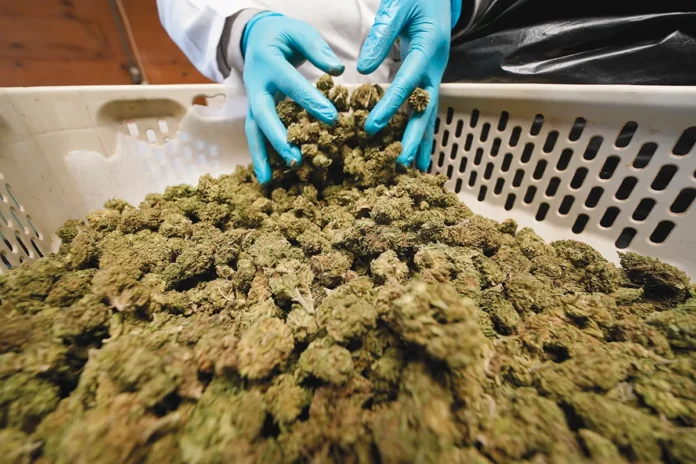PROVIDENCE – The countdown is on for recreational marijuana, with six months until existing medical marijuana stores can start selling to adult users.
Some proponents say the newly signed law is long overdue, and the impending retail sales launch can’t come soon enough. But others, including court administrators, municipal leaders and even industry representatives, are scrambling to get ready for the looming deadline.
“There are always both foreseeable and unforeseeable challenges that come up when a medical program and medical agency take the reins of an adult use program,” said Meg Nash, an attorney in the Boston Office of national cannabis law firm Vicente Sederberg LLP. “It’s reasonable to expect delays and bumps in the future.”
Nash pointed to delayed rollouts in other states including Massachusetts and New York as proof of the rocky road ahead for Rhode Island.
One potential stumbling block lies with cities and towns, who under the law can choose to opt out of hosting a retail pot shop in their community under a ballot referendum. If a majority of municipalities – and their voters- choose not to participate in the recreational marijuana market, it could limit locations for the 24 soon-to-be licensed retailers, Nash said.
“You may really push up against the ability to satisfy those goals [of the law],” she said.
How many cities and towns are considering opting out is unclear. Jordan Day, interim executive director for the R.I. League of Cities and Towns, said she hadn’t heard much one way or another. But that should be public information in a few months, since any municipality that wants to try to avoid the retail pot industry has to approve a council resolution calling for a ballot measure by early September, 90 days ahead of the Nov. 8 election.
Day didn’t think timing would be a problem, pointing out that the May 25 bill signing gives interested cities and towns a month preparation time than if the law was passed at the end of the legislative session.
“Communities considering [opting out] have probably already been thinking about it before this anyway,” Day said.
Meanwhile, existing medical cultivators will be able to start growing for recreational use Aug. 1, a deadline they can meet with ease given the abundant product available, according to Dr. Jason Iannuccilli, a radiologist and co-founder of West Warwick-based marijuana testing facility PureVita Labs LLC.
The Rhode Island marijuana market has been “treading water” for years, Iannuccilli said, hamstrung by state restrictions that barred recreational sales and limited medical dispensaries.
“These guys are ready to go now,” he said. “There is plenty of product just sitting there, it’s just a matter of procurement and testing. December almost seems too far away.”
What dispensaries may not be ready for is the crowds that Iannuccilli expected will flood through their doors come Dec. 1. Logistical upgrades like increased parking and traffic flow will need to be considered among the surge in demand expected with the new recreational market – which Iannuccilli said will triple the existing demand from medical marijuana users.
However, some retail users may need convincing to defect from their go-to, over-the-border pot shop to one closer to home. Iannuccilli stressed the importance of dispensaries marketing their product as a better experience for consumers – either in quality, price or convenience.
“The real question mark is how many customers we can bring back to the R.I. market,” said Sen. Joshua Miller, D-Cranston, who sponsored the Senate legislation.
And while the three existing compassion centers will be able to start selling to retail users by Dec. 1, Miller didn’t think the 24 additional retail shops allowed under the new law would be ready to open for at least 12-18 months, based on Massachusetts experience.
The benefit of the many years of failed attempts to legalize recreational marijuana is that the law incorporates many of the lessons learned from prior discussions, and other states, such as more rigorous standards around testing, plant tagging and other administrative components, Miller said.
Detailed regulations are left up to the three-member Cannabis Control Commission, which the governor has 40 days to name for final approval from the R.I. Senate. For now, the power rests with the R.I. Office of Cannabis Regulation, which has until Oct. 15 to publish information for and open applications to medical dispensaries that want to become retail sellers as well.
Another critical component of the law is automatic expungement of civil and criminal records for marijuana possession. While the July 2024 deadline for the courts to comply appears less imminent, the “tens of thousands” of possession charges – including those coupled with other ineligible criminal charges over the last 50 years – are going to take a lot of time and manpower to go through, according to Craig Berke, a spokesman for the R.I. Judiciary. That many of those older records are paper-only, requiring hand searches, only adds to the administrative burden.
Berke said the court expects it can meet the July 2024 deadline providing that the state includes the $340,000 for overtime and contract work in the next two budgets.
Nancy Lavin is a PBN staff writer. You may reach her at Lavin@PBN.com












